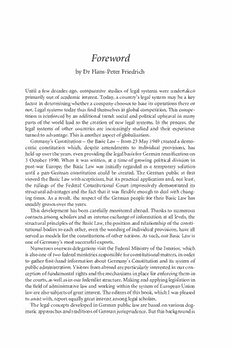
Debates in German Public Law PDF
354 Pages·2014·1.96 MB·English
Most books are stored in the elastic cloud where traffic is expensive. For this reason, we have a limit on daily download.
Preview Debates in German Public Law
Description:
Germany’s constitution – the Basic Law of 23rd May 1949 – created a democratic constitution which, despite amendments, has held up over the years, even providing the legal basis for German reunification in 1990. When it was written, the Basic Law was initially regarded as a temporary solution which would last until a pan-German constitution could be created, but, over the years, it has grown to become a mainstay of post-war stability and has even become one of Germany’s most successful exports. Foreign scholars are particularly interested in the German conception of fundamental rights and the mechanisms in place for enforcing them in the courts, as well as in Germany’s federal structure. Making and applying administrative law and working alongside the system of EU law are also subjects of great interest. This book, developed by a group of scholars in honor of the 60th anniversary of the Basic Law, offers examples of fundamental aspects of current scholarly debate. The analyses present the latest scholarly discussions, specifically for a foreign audience, touching upon administrative law, and the place of the Federal Republic within the system of European Community law, with constitutional law providing the constant framework. This book is an fascinating study for those interested in German public law specifically, as well as comparative public law more generally.
See more
The list of books you might like
Most books are stored in the elastic cloud where traffic is expensive. For this reason, we have a limit on daily download.
